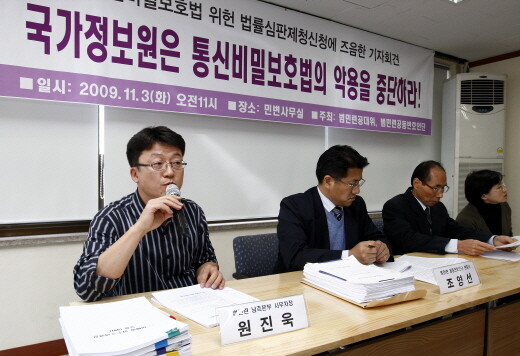hankyoreh
Links to other country sites 다른 나라 사이트 링크
Citizens test constitutionality of Protection of Communications Secrets Act

Members of the Civic and Public Joint Measure Committee against the Suppression of the Pomminryon, or Pan-national Alliance for Korea’s Reunification announced on Tuesday that they plan to file for a Constitutional Court hearing to test the constitutionality of the Protection of Communication Secrets Act during a press conference held at MINBYUN-Lawyers for a Democratic Society’s office located in Seoul’s Seocho neighborhood. The decision was reached in consideration of the National Intelligence Service’s (NIS) involvement in long-term packet eavesdropping against the South Korean branch of the Pomminryon. Packet eavesdropping, which involves detailed monitoring of Internet activity, has been confirmed through the investigation documents submitted in a case against the Pomminryon.
According to the investigation document filed against Lee Kyung-won, the Pomminryon’s director, obtained by the Hankyoreh on Nov. 2, the NIS has engaged in packet eavesdropping in the committee’s Internet network for a 28-month period that began in 2003. The Seoul Western District Court issued a warrant for the packet eavesdropping on Nov. 26, 2004.
Since 2003, the NIS has had 18 warrants for communication interception approved. In one case, NIS had a warrant approved for packet eavesdropping against Pomminryon in April 2009, two months prior to the NIS indictment of three Pomminryon leaders, including Chairman Lee Kyu-jae. The warrant allows the NIS to monitor all lines of communication, including email, fax, and phone lines.
Won Jin-wook, the vice director of Pomminryon said, “The NIS submitted a document that used Pomminryon leaders’s mobile phones to track their whereabouts.” Won added, “This document reveals that the NIS has engaged in an indiscreet investigation against target civic organizations.”
Pomminryon defense team’s opinion letter submitted to prosecutors who are now examining the case states, “The Protection of Communications Secrets Act only permits the interception of communications in a limited fashion.” They continued, “The NIS, which has engaged in packet eavesdropping against Pomminryon for a long period of time, has engaged in an indiscreet investigation.”
Prosecutors’ official response is, “There are no problems with the how the NIS has conducted its investigation since it has conducted it in accordance with the Protection of Communications Secrets Act.”
Accordingly, Jang Yeo-gyeong, policy chief of the Jinbonet said, “The Protection of Communications Secrets Act was originally enacted to protect communications secrets, but has been since abused by the NIS in order to engage in surveillance of citizens.”
Please direct questions or comments to [englishhani@hani.co.kr]
Editorial・opinion
![[Column] Has Korea, too, crossed the Rubicon on China? [Column] Has Korea, too, crossed the Rubicon on China?](https://flexible.img.hani.co.kr/flexible/normal/500/300/imgdb/original/2024/0419/9317135153409185.jpg) [Column] Has Korea, too, crossed the Rubicon on China?
[Column] Has Korea, too, crossed the Rubicon on China?![[Correspondent’s column] In Japan’s alliance with US, echoes of its past alliances with UK [Correspondent’s column] In Japan’s alliance with US, echoes of its past alliances with UK](https://flexible.img.hani.co.kr/flexible/normal/500/300/imgdb/original/2024/0419/2317135166563519.jpg) [Correspondent’s column] In Japan’s alliance with US, echoes of its past alliances with UK
[Correspondent’s column] In Japan’s alliance with US, echoes of its past alliances with UK- [Editorial] Does Yoon think the Korean public is wrong?
- [Editorial] As it bolsters its alliance with US, Japan must be accountable for past
- [Guest essay] Amending the Constitution is Yoon’s key to leaving office in public’s good graces
- [Editorial] 10 years on, lessons of Sewol tragedy must never be forgotten
- [Column] A death blow to Korea’s prosecutor politics
- [Correspondent’s column] The US and the end of Japanese pacifism
- [Guest essay] How Korea turned its trainee doctors into monsters
- [Guest essay] As someone who helped forge Seoul-Moscow ties, their status today troubles me
Most viewed articles
- 1[Column] The clock is ticking for Korea’s first lady
- 2Samsung barricades office as unionized workers strike for better conditions
- 3After 2 months of delayed, denied medical care, Koreans worry worst may be yet to come
- 4[Correspondent’s column] In Japan’s alliance with US, echoes of its past alliances with UK
- 5[Column] Has Korea, too, crossed the Rubicon on China?
- 6Hong Se-hwa, voice for tolerance whose memoir of exile touched a chord, dies at 76
- 7All eyes on Xiaomi after it pulls off EV that Apple couldn’t
- 8US overtakes China as Korea’s top export market, prompting trade sanction jitters
- 9[Photo] Smile ambassador, you’re on camera
- 10[Guest essay] How Korea turned its trainee doctors into monsters